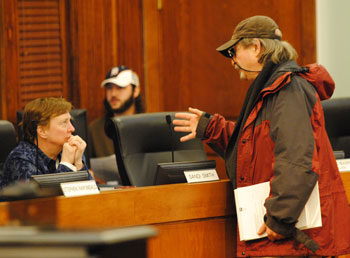Ann Arbor city council meeting (Feb. 22, 2011): In a meeting that wrapped up in less than two hours, the council handled several agenda items, including: an affordable housing site plan from Avalon Housing at 1500 Pauline; authorization of increased golf fees; reappointment of the golf task force; an appointment to the environmental commission; and the purchase of new police cars.

Before the Feb. 22 council meeting, Sandi Smith (Ward 1) chatted with Dennis Hayes about the medical marijuana licensing ordinance. The council delayed taking action on the ordinance. (Photos by the writer.)
However the council chose to delay some of its business due to the absences of four members – Carsten Hohnke (Ward 5), Marcia Higgins (Ward 4), Christopher Taylor (Ward 3) and Stephen Rapundalo (Ward 2). By way of explanation for the four absences, mayor John Hieftje offered the fact that it’s vacation week for the Ann Arbor Public Schools.
The delayed business included a set of proposed licensing rules for medical marijuana businesses. The council heard from advocates of medical marijuana during public commentary at the start of the meeting, but when they reached the item on their agenda, the seven councilmembers who attended the meeting decided to postpone their vote on the issue without deliberating on or amending the licensing proposal. It marks the fifth time the council has decided not to take an initial vote on the licensing, dating back to Dec. 6, 2010. The council must take two votes on any new ordinance.
Also delayed were two easements – one for pedestrian access and one for public utilities – from Glacier Hills Inc., a retirement community. Under the city charter, eight votes are required for approval of such easements. Rather than have the easements fail on a 7-0 vote, the council chose instead to postpone action.
During his communications, city administrator Roger Fraser gave the council a broad-strokes overview of potential impacts that Gov. Rick Snyder’s proposed state budget could have on the city of Ann Arbor. In a roughly $80 million general fund city budget, the $2.4 million projected shortfall – on which current reduction targets are based – could increase by $0.5 million (to $2.9 million) or by $1.7 million (to $4.1 million), depending on how state revenue sharing and state fire protection grants are handled in the state budget. The state’s fiscal year begins on Oct. 1, but the city of Ann Arbor must finalize its own budget in May, for a fiscal year starting July 1.
During public commentary, the council heard a suggestion that Ann Arbor follow the example of Ypsilanti and add parking lots to its snow-clearing ordinance. And during its communications time, the council scrutinized the city’s snow removal performance in connection with a recent storm. Snow began falling the previous Sunday afternoon, accumulating to at least six inches – and more, in many areas – by early Monday morning, when the snow stopped. Highlights from city administrator Roger Fraser’s report on the snow removal effort included the fact that two of the city’s 14 large plowing vehicles were down for maintenance and the fact that forecasted amounts of snow were much lower than what actually fell.
During public commentary, the city also heard from Douglas Smith regarding a Freedom of Information Act appeal that involved redaction of police reports. Over the last several months, Smith has addressed the University of Michigan regents and the Washtenaw County board of commissioners on a range of specific cases that all relate to the general issue of civilian oversight of police power. [Full Story]





